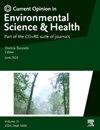On the impact of electric vehicle transition on urban noise pollution
IF 6.6
Q1 ENVIRONMENTAL SCIENCES
Current Opinion in Environmental Science and Health
Pub Date : 2025-04-22
DOI:10.1016/j.coesh.2025.100623
引用次数: 0
Abstract
The transition from internal combustion engine vehicles (ICEVs) to electric vehicles (EVs) in modern cities has significantly increased in recent years. Since electric motors are considerably quieter than internal combustion engines, this transition may reduce noise pollution in large urban settings. This reduction is important because noise is still the second most significant environmental risk after air pollution. There is consensus that EVs can reduce noise at low speeds and frequencies, especially for heavy-duty vehicles. However, case studies indicate that at speeds over 50 km/h, EVs do not contribute significantly to noise reduction. Additionally, the effect of mandatory Acoustic Vehicle Alert Systems and fast-charging facilities on overall noise levels is still unclear. This article concisely reviews recent developments about replacing ICEVs with EVs in urban areas from an environmental noise viewpoint. It intends to summarize the available literature and highlight future research trends.
电动汽车转型对城市噪声污染的影响
近年来,现代城市从内燃机汽车向电动汽车的过渡明显加快。由于电动机比内燃机安静得多,这种转变可以减少大城市环境中的噪音污染。这种减少很重要,因为噪音仍然是仅次于空气污染的第二大环境风险。人们普遍认为,电动汽车可以在低速和低频下降低噪音,尤其是重型汽车。然而,案例研究表明,在超过50公里/小时的速度下,电动汽车对降低噪音没有显著贡献。此外,强制声学车辆警报系统和快速充电设施对整体噪音水平的影响尚不清楚。本文从环境噪声的角度简要综述了城市地区电动汽车替代内燃机汽车的最新进展。它旨在总结现有的文献,并强调未来的研究趋势。
本文章由计算机程序翻译,如有差异,请以英文原文为准。
求助全文
约1分钟内获得全文
求助全文
来源期刊

Current Opinion in Environmental Science and Health
Medicine-Public Health, Environmental and Occupational Health
CiteScore
14.90
自引率
0.00%
发文量
92
审稿时长
114 days
 求助内容:
求助内容: 应助结果提醒方式:
应助结果提醒方式:


